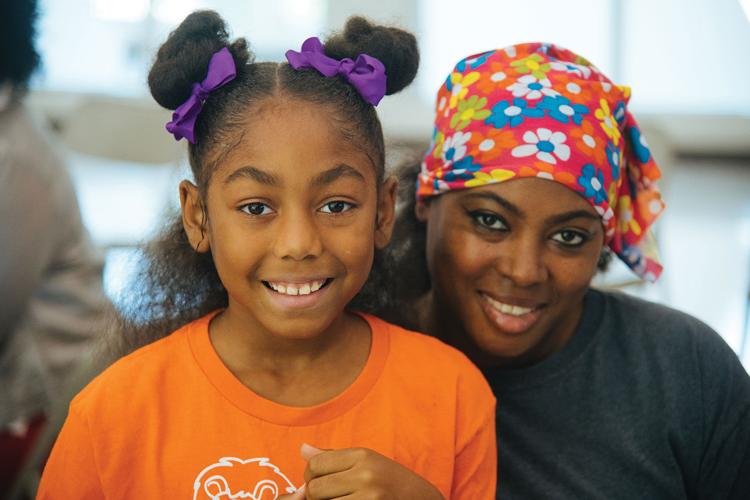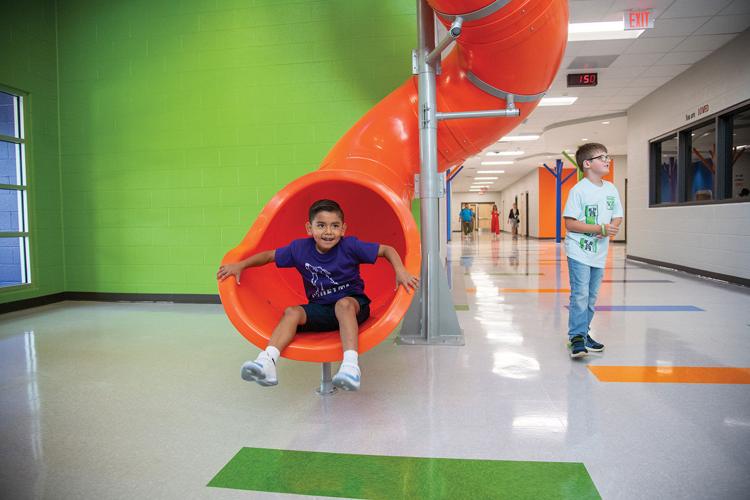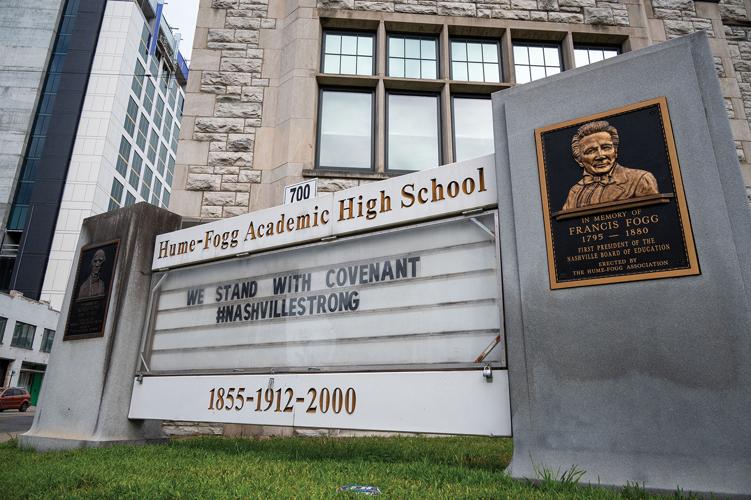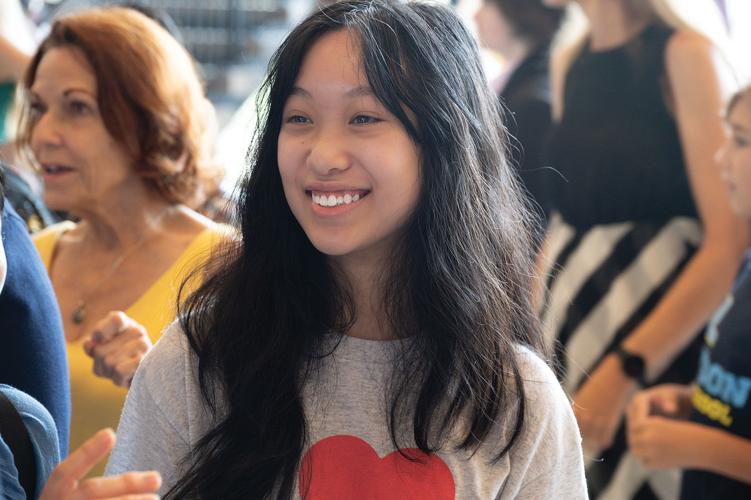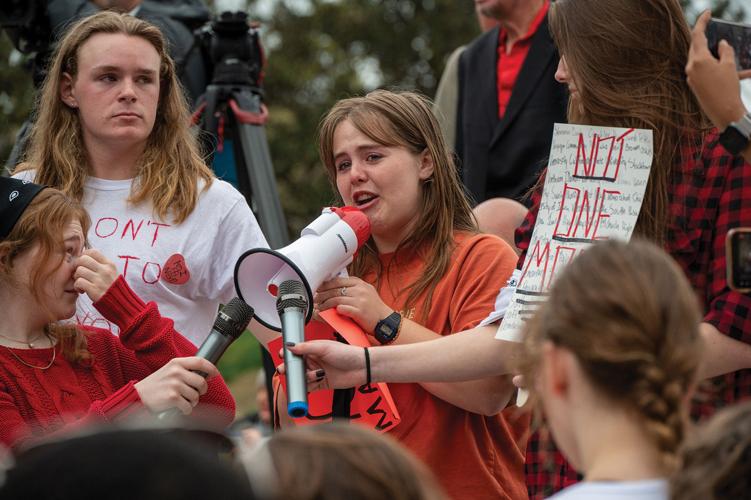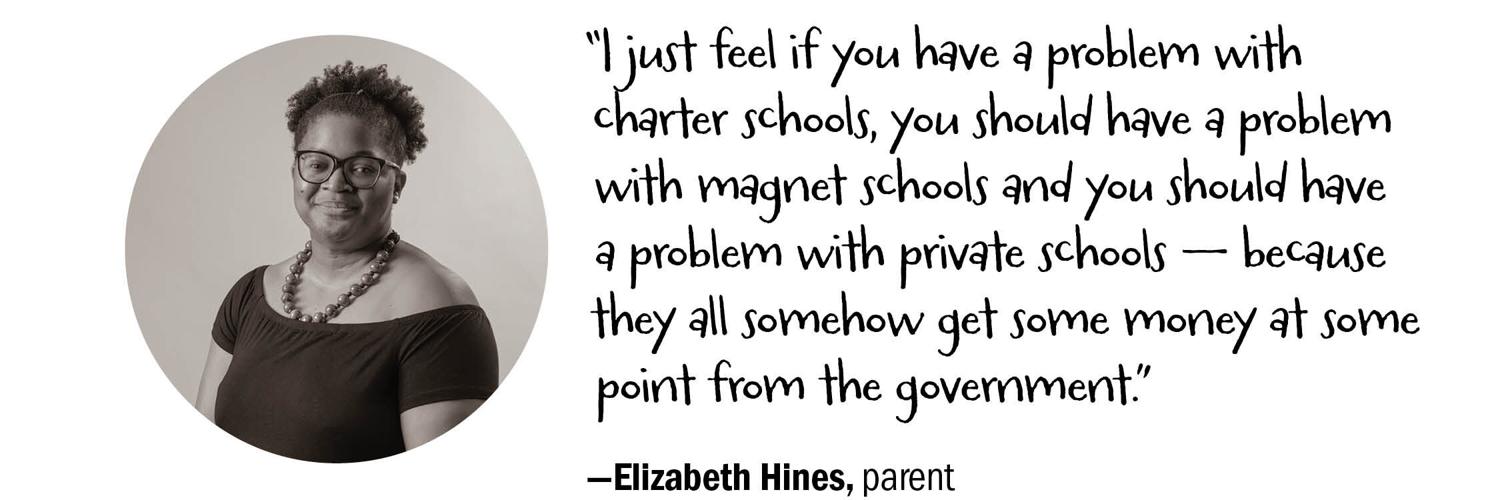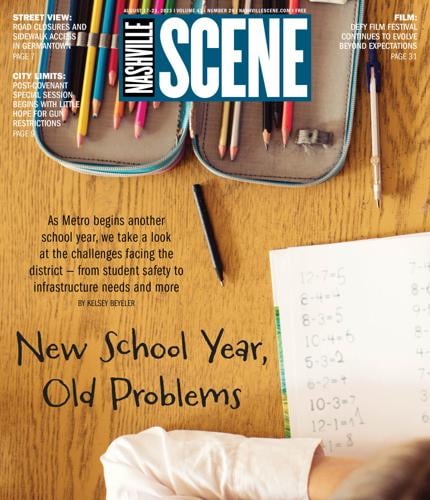So much is happening throughout the Metropolitan Nashville Public Schools system at any given moment. Around 80,000 students attend more than 160 schools in Davidson County. They represent an array of cultures, socioeconomic statuses, personalities and interests, all of which converge within the classroom.
Every student, employee, parent and community member has their own unique perspective on the district, based on their own experiences. The range is drastic, especially in a large urban school system like MNPS. Some love their alma maters and credit their success to them. Others have had traumatizing experiences at public schools. An array of social issues intersect within classrooms, from adverse childhood experiences to political disputes and societal dangers — and so schools are much more than education centers. Sometimes they provide opportunities for triage for students who need it, with school staff helping families identify students’ disabilities, connecting those experiencing homelessness with resources or assisting people who come from other countries.
District leaders often paint a very different picture than do students, parents and educators. They tout growth and accomplishments, and while much of that is true, schools are failing some students for myriad reasons. There is also joy inside the classrooms, and many school employees are passionate and caring adults who teach because they feel called to do so. All of this is what makes the district so complicated. For each win to celebrate, there’s another difficulty to address, and finite resources to do it with.

Goodlettsville Elementary students enjoy the new slide inside the school
Two causes for celebration come via a couple of shiny new schools. Bellevue’s James Lawson High School and the new and improved Goodlettsville Elementary School both had their first first day of school this year. Each has exciting new bells and whistles.
A replacement for Hillwood High School, James Lawson High is named after the minister and civil rights leader who helped train young activists including Diane Nash and John Lewis to participate in the Nashville Student Movement. The school has three Academies of Nashville — an esteemed program that has received national attention and is meant to prepare students for specific career paths. James Lawson High students can enter the academy of art, design and communication; business and hospitality; or health sciences. An ambulance was brought into one of the medical-oriented classrooms.
“We’re just fortunate that we have such a big, beautiful facility to start with,” James Lawson executive principal Stephen Sheaffer tells the Scene at the school’s ribbon-cutting event. “Now we’ve got to make it come alive.”
“It’s definitely nerve-racking, because I do miss Hillwood,” says Christine Tran, a Hillwood High School junior who will soon serve as a student school board member. “I think it’s a good opportunity to meet other people, which is really nice.”

James Lawson High student Christine Tran
Goodlettsville Elementary School was designed to emphasize social and emotional learning for its young students. Classrooms have “peace corners” where kids can calm down and self-regulate. If that doesn’t work, the school has built-in sensory supports to utilize, plus a vending machine full of books and an indoor slide for fun.
Lamarra Robinson is a student at Goodlettsville Elementary who sang with the school’s choir during the ribbon-cutting ceremony. She shined while performing a solo during a song written by music teacher Latrice Stanley and her father: “I see greatness all around me / From my right to my left on the inside of me / I can be whatever I choose to be / ’Cause there is greatness on the inside of me.”
Lamarra tells the Scene that she wasn’t too nervous about singing the solo. She isn’t all that nervous to start the new year, either. She is “excited about a lot of things” in the coming school year, like meeting her new teacher, seeing her new classroom and making new friends. Her mom is also excited about the new school building.
For many students and staff members, the first weeks of school are accompanied by a mix of nerves and excitement as everyone familiarizes themselves with their new routines and classmates. “Getting into that new routine, that new normal for us, is a little nerve-racking,” says Goodlettsville Elementary School assistant principal Alicia Peters.

Goodlettsville Elementary student Lamarra Robinson and her mother
Hillwood High School and Goodlettsville Elementary School students were in serious need of new school buildings. The former had been open for 64 years, and at the old Goodlettsville Elementary, tiles regularly fell from the ceiling. Peters was a teacher back then, and she says she had to put a kiddie pool in her classroom for the debris. She was teaching when then-U.S. Rep. Jim Cooper and former school board member Jill Speering came to see the school’s Veterans Day program — and parts of the ceiling fell in front of them. Executive principal Tracy Gibson described it as the “impetus” for the new school.
“Two things,” said Jim’s brother, Mayor John Cooper, at the ribbon-cutting event. “Don’t wait for a roof to fall in before you get a new school. But secondly, if it does fall, you want it to fall on a congressman … because then you really, probably get action.”
The joke touched on a bleak reality: Needed investments like these are too few and too far between.
A similar moment happened at the most recent MNPS board meeting, which aligned with the first day of school on Aug. 8. As board members celebrated the new schools, District 4 representative Berthena Nabaa-McKinney asked when her district would be receiving some “love.” People laughed at the semi-rhetorical question, despite the seriousness of the need. Other schools are receiving renovations, and more new schools are being planned, but the process is a long one. Projects like these depend on funding, and even though the Metro Council and Mayor Cooper have increased city spending on education, sacrifices are always made.
MNPS employees, for example, got a lower cost of living adjustment than other Metro employees this year. Many can’t afford to live in the communities they work in.
Building improvements are just one manifestation of the copious needs of MNPS. Each school has its own challenges, and entire organizations exist to support them. Communities in Schools is an organization that helps meet student needs by connecting them with community resources. PENCIL provides teachers with supplies so they don’t have to pay for them out of their own pockets. Nashville PROPEL advocates for equitable education by equipping parents with the information necessary to navigate the district.
“The status quo [is] having very minimal growth, at a very slow rate,” says PROPEL executive director Sonya Thomas. “We have a lot of parents who are concerned about their children reading on grade level, we have a lot of parents who are concerned about the safety of children — as they should — and we have a lot of parents who want their voice amplified within the district and don’t feel like they’re being heard, nor can they effectively navigate the system.”
Nineteen Metro public schools are on the state’s “priority” list, meaning they perform within the bottom 5 percent in the state. Families zoned for these schools have other options, but sometimes those come with stigma attached. Alongside traditional zoned public schools, students can also enter a lottery to attend another MNPS school, or they can attend charter schools or private schools. In the name of “school choice,” Gov. Bill Lee shepherded an education savings account program through the state legislature that allows some students to use public money to attend private schools. Critics argue that charters and ESAs drain much-needed public funding from traditional schools. Many times, low-performing schools struggle because they’re underinvested or serve student populations with needs that can stunt academic progress, like food insecurity. Who could blame a parent for wanting to provide the best possible education for their child?
Elizabeth Hines is the parent of two fifth-graders. She is the former chair of the Parent Advisory Council and is currently studying to become a teacher herself. Her kids had a hard time at their previous school, and after exploring a few options, they decided to attend a charter school. Hines says she had to defend her decision.
“My husband wanted the other MNPS school,” says Hines. “I’ve never been like, ‘Oh my gosh, charter schools are taking all the money.’ … I just feel if you have a problem with charter schools, you should have a problem with magnet schools, and you should have a problem with private schools — because they all somehow get some money at some point from the government. So that’s why I’ve never gotten into that battle.”
Jasson Cring is the father of three boys in the MNPS system. One of his sons, Johann, attends Meigs Middle Magnet School. Another goes to Hume-Fogg Academic High School. Cring recognizes the privilege in that.
“The process in which we have to figure out where our kids are gonna go to school, the lottery process, it’s insane,” says Cring. “The system needs to be improved to where you don’t have to circumvent and literally do a lottery to be able to get your kids the best possible education.”
Of course, most students aren’t really tuned into the school-choice conversation — they’re just going to school.
“I am very excited to see all of my friends again,” Johann told the Scene before classes started, noting that his favorite part of school is lunch and his least-favorite part is writing essays. “I’m nervous about meeting other people, and other teachers. … I hope I don’t have too much homework.”
Wyatt Bassow is about to start college in Florida, where he’ll study political science with a minor in law, justice and advocacy. A former Hume-Fogg student, Bassow helped organize protests against gun violence at the state Capitol following the Covenant School shooting, and reflects on his education in the MNPS system.

Wyatt Bassow (top left) at a gun violence protest at the state Capitol
“The schools that I got to experience put me in a place where I know exactly where I want to be in four years — or at least I think I do at this very moment — but I know that’s not [always] the case,” says Bassow. “It sounds like I’m tooting my own horn, but [I’m] unique because we’re not setting up our kids for success currently in our system. But Hume-Fogg is the best public school in Tennessee. … We don’t have that same system at Stratford, which was my zoned school. Talking to my friends, who don’t have the same direction, it’s not because they don’t have the passion. It’s because they don’t have a direction from the system.”
Political advocacy has motivated Bassow’s career plans. He wanted to study juvenile psychology, but changed his mind when he realized he’d rather “try and be the systematic change as opposed to helping people once they’re in the system. So trying to involve myself and get ahead of the gun — quite literally.”

Being a student today means being aware of seemingly constant school shootings that happen across the nation. March 27’s shooting at Covenant School — a private school in the Green Hills area — resulted in the deaths of three students and three staff members. The possibility of another local shooting looms heavy.
“It’s on my mind every single day,” Goodlettsville Elementary School assistant principal Peters tells the Scene. The new school was built with safety features in mind, such as the large decorative spheres outside that could also prevent a vehicle from crashing into the front of the building.
To prevent future tragedies from occurring, MNPS — like many school districts — is bolstering its security strategy. This includes a strict door-locking policy, security vestibules, video cameras, security drills, shatter-resistant film for glass and more. Metro Nashville Police Department officers will also be more present at schools. MNPD, not the school district, manages and implements the school resource officer program. It’s seeking to fill all remaining vacancies and eventually add more positions so SROs can work in elementary schools — a move that school district leaders have pushed against in the past. We won’t see official SROs in elementary schools this year, but officers have been and will continue to be regularly present. The school district is also hiring safety ambassadors — unarmed plainclothes officers — in elementary schools to work as liaisons between MNPS security and the police department.
The increased presence of cops is a widely debated topic, as some argue that SROs negatively impact learning environments and increase a student’s likelihood to enter the school-to-prison pipeline. Then again, some parents, faculty and students really like their SROs and consider them a vital part of their school community. Increased police presence was part of Elizabeth Hines’ decision to move her kids from their previous school.
“It really made me feel powerless as a parent,” says Hines. “It got to a point where I stopped taking my kids to school in the morning. … For me it was just so upsetting that I asked my husband to start taking them.”
Ibti Cheko is a Hume-Fogg junior who volunteers with student-led gun-reform activist group Students Demand Action. Ibti says she doesn’t want so many police officers in schools — she wants gun reform. She wants to focus on her AP classes this year, yet she volunteers her time as an activist so she and other students can feel safer in schools.
“I don’t think people understand how it genuinely affects your well-being, like your mental health,” says Ibti. “Making sure that when you use the bathroom you come back in as quickly as possible so that, if there’s a lockdown or something, you’re not out in the hallways with no room to protect you just stresses you out, and you shouldn’t have to worry about [it]. And it’s just that stress and that anxiety — that even if nothing ends up happening, and no one ends up coming — it’s still a lot on your mind. We’re kids. It’s not our responsibility to make sure that we’re safe at school, somewhere that we’re required to be at.”
Maryam Abolfazli is the parent of a kindergartener and founder of Rise and Shine Tennessee, a grassroots organization working toward gun reform, among other goals. “You either can bury your head in the sand to just move forward and enjoy this magic of your kid starting school, or you can be present to the many layers of concern,” she says. “Parents have become real experts in how you equip a school to keep your kid safe.”
The school district has virtually no power over SROs or the Tennessee General Assembly, which has passed legislation to harden schools but not to regulate firearm access. Following the Covenant School shooting, thousands of people showed up at the Capitol to advocate for gun reform, and many will likely return next week: Gov. Bill Lee called a special session of the legislature to convene Aug. 21 and address gun laws — even though his fellow Republicans have pushed back against the session and Lee’s proposed extreme risk protection orders.
“It’s emotions of rage and sadness,” says Abolfazli. “We’re kind of exactly right back to March 27, because we got to take a break from it because school was out. Now everyone’s just re-feeling that sinking feeling of dropping your kid off at school in the morning, and having absolutely no power to keep them safe when they’re there.”
Meanwhile, some educators are suing the state over a law that the legislature passed a few years ago. Driven by culture wars and conservative trends, the legislature passed a law that broadly but vaguely limits schools instruction around topics like race and sex. Educators and the Tennessee Education Association say the legislation negatively impacts their ability to educate students. The lawsuit states that, due to the law, a school in Tipton County no longer takes field trips to Memphis’ National Civil Rights Museum — instead, they take students to a baseball game.
Another unpopular law that recently went into effect seeks to boost state literacy scores by requiring third-graders to be retained if they don’t score high enough on state testing and don’t participate in mandated learning interventions and show adequate growth.
“The week of the test, they were very anxious,” says Goodlettsville Elementary School principal Gibson about last year’s third-graders. “You had kids that were in tears taking it, and it was bad. It was really bad.”
After testing and retesting, along with summer school, around 1.4 percent of MNPS third-graders have been retained because of the law. An additional 20.1 percent of students were promoted but are required to receive tutoring in fourth grade and show proficient growth on the next Tennessee Comprehensive Assessment Program. Folks can sign up to tutor fourth-graders at acceleratingscholars.org.
Early morning at James Lawson High School, seniors crowd the courtyard before entering their new building. A bubble machine furiously blows bubbles onto the scene, and some cars have “SENIOR” painted on their windows. Some students wear decorated paper crowns indicating that they’re in the graduating class of 2024. Younger kids watch as their older siblings — and staff, equipped with their lanyards and walkie-talkies — buzz around the building. After some courtyard mingling and reconnecting, adults cheer on the seniors as they cross the threshold of the building, starting the first day of their last school year.
“I’m most excited about the opportunities that the school has,” says a senior named Sam who transferred from a private school. “I feel like there’s a lot of opportunities here versus most schools in the area, so I’m very excited to take advantage of those.”
“It’s very new and nice and seems like we’re getting a lot more people, and it’s just very exciting,” says a fellow student named Lil.
Similar scenes are playing out across the city. PROPEL’s Sonya Thomas enjoys the experience of sending her kid off to school and welcoming other students into their building. “It level-sets and gets me really focused on the work that we have to do and how important it is to this city,” says Thomas.
Though conversations around public education are often heated, and opinions on the best ways to go about it differ wildly, parents and educators just want their students to thrive in a safe and productive learning environment. Students deserve that. Anyone who wants to support this work has a variety of avenues to do so through, whether that’s tutoring a student, engaging with the entities that support them, advocating for better schools or even just listening to what students have to say, and meeting their needs.
“We need each other,” Thomas says. “We need great educators and parents. And then, the educators need us to be partners with them. And I think that I’m optimistic about that. That is what I want to be true, when it’s all said and done, is that we all work together to make sure that children get what they need and they deserve.”


